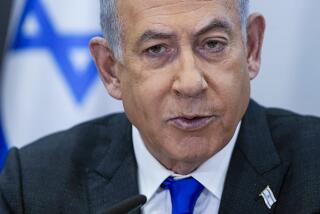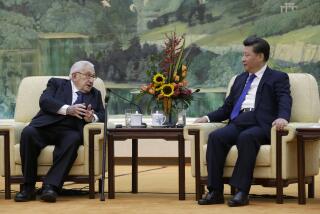Capital Conference to Put Spotlight on Nixon : Foreign policy: Ex-President’s library hopes to enhance its position by sponsoring meeting on the proper U.S. role in the post-Cold War world.
- Share via
WASHINGTON — The nation’s capital, where former President Richard M. Nixon is still reviled by some as an unindicted Watergate conspirator, will be the stage this week for an unusual and ambitious display of Nixon’s skills as elder statesman and geopolitician.
The former President and his secretary of state, Henry A. Kissinger, as well as President Bush, are among the foreign policy heavyweights scheduled to participate in a two-day conference on “America’s Role in the Emerging World,” sponsored by Yorba Linda’s Richard Nixon Library & Birthplace.
The event, which begins Wednesday, is not only a coming-out for Nixon, who has not made a major foreign policy address in Washington in five years. It also is an effort by the fledgling library to establish a beachhead in the Eastern foreign policy Establishment, less than a year before the institution embarks on a major endowment drive.
“We felt that in order to have the kind of decisive impact we hoped to have on the direction of American foreign policy, we needed to convene our conference in the place where foreign policy is made,” said John H. Taylor, library director.
“We feel that it’s an ideal time to bring together an extremely diverse and bipartisan group of very heavy-hitting thinkers and practitioners and talk about what the role (of the United States) should be in the post-Cold War world,” Taylor said.
Nixon is to address the conference at noon Wednesday, while Bush is to speak that evening. Nixon has reportedly promised to linger and take part in the panel discussions after his address.
Other participants are to include James R. Schlesinger, secretary of defense and director of central intelligence during the Nixon Administration; Robert Gates, the current CIA director; Vladimir P. Lukin, the Russian Federation’s ambassador to the United States, and Zbigniew Brzezinski, national security adviser to former President Jimmy Carter.
Nixon’s decidedly internationalist views are likely to be the jumping-off point for debate, Taylor said.
“I’m sure there will be some views expressed by people who believe the United States should not take an aggressive role internationally, as President Nixon feels it must continue to do,” he said.
There is speculation in diplomatic circles that Bush may use the occasion to announce a new foreign aid initiative to the former Soviet republics.
“Some people are betting that (Bush) will announce a comprehensive program of assistance to the former Soviet Union,” said Robert E. Hunter of the Center for Strategic and International Studies in Washington. “I think that would be wise, and I hope he does it.”
Others, however, believe that the conference may only spotlight the shortcomings in the Bush Administration’s foreign policy apparatus.
“The Bush Administration has been badly remiss, doing very little work in trying to redesign America’s role in the post-Soviet world,” said Burton Yale Pines, senior vice president of the conservative Heritage Foundation.
“The most important thing that Bush could do is announce that he’s ordering the State Department to begin a thorough analysis of what America’s role in the world should be. . . . This hasn’t happened. It’s astounding that it hasn’t happened.”
The conference also promises to rekindle debate in Washington over Nixon’s place in the nation’s history.
Since he resigned office in disgrace in 1974, Nixon has written eight books, largely on foreign policy, and has regained a niche in the pantheon of U.S. elder statesmen. The former President’s latest book, “Seize the Moment: America’s Challenge in a One-Superpower World,” was published in January to largely favorable reviews.
Nevertheless, Helmut Sonnenfeldt, a Brookings Institution scholar who was on Nixon’s national security staff, said some in Washington “take it hard that he’s back, getting public attention and good notices for his book and his views. Some people think it’s downright sacrilegious or immoral.”
Whatever the public reaction to Nixon, some scholars said they believe that conference sponsors are banking on the event to help establish the Nixon library as a serious center of foreign policy study.
And that, they said, may help with next year’s library fund raising.
The library, which opened in 1990, is the only one of the 11 presidential libraries that is not supported by taxpayers. It was built for $19.5 million, financed by private donations. An extra $6.5 million raised by the library will keep it operating until it establishes a permanent endowment. That effort is to begin in January, Taylor said, in conjunction with the celebration of Nixon’s 80th birthday.
The costs of the Washington conference are being underwritten by private foundations and corporations.
More to Read
Sign up for Essential California
The most important California stories and recommendations in your inbox every morning.
You may occasionally receive promotional content from the Los Angeles Times.













